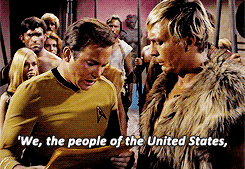I think there's room for both, and also that a great deal of the talk about TNG's "evolved" humans and supposedly "dull" characters is way oversold.
The fact of the matter AFAICS is that TNG's characters got steadily
more human and relatable as the show progressed, not less so. Picard, for instance, while he usually found a way to do the right and moral thing, is also really the only Captain we've ever seen break down under torture or weep in the arms of a family member about post-traumatic stress. Riker got to evolve from a second-string Young Kirk analogue into a character with his own dignity, gravitas and human vulnerabilities; Frakes' acting chops are taken for granted and lightly dismissed these days, like much else about the rather tiresome posthumous axe-grinding with TNG, but material like "Frame of Mind" would have been well beyond a lesser actor or one with a different skill set -- I don't think The Shat (PBUH) could have pulled that kind of material off as believably, for instance -- and it was largely Frakes' work that made "The Pegasus" a genuine TNG classic. Troi and Crusher both developed into much more considerable presences than either of them were in the early seasons, hence the classic Troi episode "Face of the Enemy" and Crusher holding her own with Picard in "Attached." So also with Worf, Data, and LaForge; TNG quite simply featured the strongest across-the-board character development of any Trek show to that point. Arguably of any Trek show period, although there's strong competition from DS9.
That the "evolved" conceit led to overly-cushy notions of the Federation and constrained storytelling in some ways is true, but this whole notion that it supposedly led to "dull" or "unrelatable" characters is a very hard sell for me. There's no accounting for taste, but on the whole I just don't buy it; if it were really true, TNG would never have become the most popular televised edition of the show. If anything, the worst character sins TNG committed were on the big screen, where all of that character work was basically tossed out the window.
At the same time, I liked NuBSG's take on character work, too. That's a radically different setting where people are living out a reality not too unlike
one of those seen in "Parallels", where people are struggling to overcome desperate and extreme circumstances. That necessitates very different dynamics and stories, and NuBSG was right to go in that direction... albeit it would have been nice if they'd planned out the arc a little more.




 For the love of Chrysler some of y'all need a hobby.
For the love of Chrysler some of y'all need a hobby.